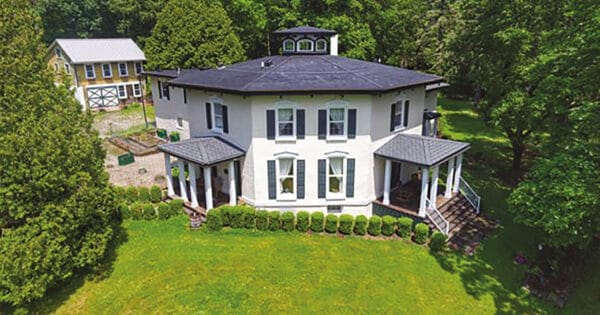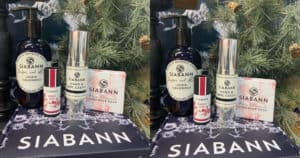
Thinking about making your business more vegan friendly? Miranda and Simon run The Black Sheep Inn, a 100% vegan hospitality business in the US. They share their experience of running a vegan business and easy ways you can make vegan friendly changes.
Between 2014 and 2019, the number of vegans in the UK quadrupled (Statista, 2022), and this number is still on the rise.
According to Statista, there were approximately 600,000 vegans in the UK in 2019. In 2021 another survey found that approximately 42% of adults in Great Britain consume meat substitutes once a month or more.
The number of vegans, vegetarians, and flexitarians across the UK is constantly rising and the hospitality business needs to be on top of it.
The reasons for swapping to a vegan diet are numerous and change from person to person.
Whether health, environmental concerns, animal cruelty or some other reason entirely, maybe it’s time to look at how your business can become more vegan friendly.
The Black Sheep Inn and Spa is a British owned, 100% vegan hospitality business located in upstate New York, USA.
Miranda Jones and Simon Nicholls moved from the UK to America in early 2020 for a career change and because they both live a vegan lifestyle, they moulded the business to match.
“I was a lifelong vegetarian but became less and less comfortable with the dairy and egg industries,” explained Miranda.
“Then a friend began exploring a vegan diet, so through her and watching documentaries like Cowspiracy and What The Health, I made a decision back in 2016 to become fully vegan.”
Simon’s decision to become vegan was for health reasons.
“Some people aren’t interested in the ethical aspects of it, but they do sit up and listen when I say a vegan diet rapidly changed my vital signs for the better,” he said.
With so many people swapping to vegan diets and the vegan consumer market growing year on year, it’s time for hospitality to catch up.
Miranda and Simon shared the benefits of running a vegan business and their advice for implementing vegan friendly options.
Running a vegan business
“From a personal perspective, it feels great to be doing something that you’re so passionate about and sharing your passion with other people,” said Miranda.
“But we don’t ram it down people’s throats or preach veganism to people,” added Simon.
“We deliberately try not to make a big deal about it,” he said.
“Yes, we promote the business as being vegan and plant-based, but once people actually walk through the doors, to us it shouldn’t be a big deal.”
Funnily, every now and then, some of the guests arriving at The Black Sheep Inn don’t realise it’s a vegan business.
“In the last couple of years, there’ve been two or three occasions where one person in a couple wasn’t told we are 100% vegan until they were at least en route,” laughed Simon.
“But actually, the majority of our guests over the last two years or so, haven’t been vegans, and we’ve not had a single complaint. It clearly hasn’t bothered people that we’re 100% vegan.
“If you look at the reviews, they say Miranda’s food is magnificent and that her homemade vegan muffins are better than non-vegan muffins. So we’re clearly doing something right.”
Miranda added: “It’s like we’re changing people’s perceptions by stealth, really.”
“We’re not trying to convert people,” said Simon.
There are a number of couples who have repeatedly stayed at The Black Sheep Inn, none of which are vegans.
It just goes to show that running a vegan business doesn’t limit your audience.
But despite this, a vegan hospitality business will present challenges for the owners.
“I think there’s this perception that vegans are hippies and a bit weird,” said Simon, “but I think people are more accepting of the term plant-based.”
Miranda added: “There’s a lot of people who are more curious about eating plant-based diets now and we have been fairly well received.”
“We’re not trying to convert people.”
Simon and Miranda came back to England earlier in the year and were really pleased to see the growth in shelf space allocated to vegan foods in supermarkets.
“I know it was Veganuary so it was a little different, but there were way more options on the shelves than when we left in 2020,” said Simon.
“And it’s sort of reflected over here in the US. Even our local village shop has a considerable amount of vegan products.”
Miranda explained that one of the biggest challenges they’ve faced is being able to recommend local restaurants to guests who are vegan.
“There aren’t many options for vegans when they want to eat out,” said Miranda.
“Having said that though, we did speak to some local restaurants and they do now offer a vegan option for their evening meals, which we really appreciate.
“Give it another 18 months and I think the restaurant options available to vegans will improve.”
Becoming vegan friendly
Now you know what it’s like to run a vegan business, the question is, will you make any changes?
Will you jump straight in at the deep end and become 100% vegan, make gradual changes over time, or just dip your toe in the water by offering vegan alternatives?
Whichever way you may choose to try this, it’s never too late to start and both Miranda and Simon shared some helpful advice to help get you started.
“There’s so many cruelty free, plant-based toiletry products available that you could easily swap in,” said Miranda.
“We use Neal’s Yard toiletries, which is an organic, vegan, British brand, and all of the household products that we use in cleaning and washing are plant-based and cruelty free too.”
All you need to do is a little bit of research and you’ll soon find the right providers for your toiletry products.
“Also, as a vegan, the thought of having feather duvets and bedding would be absolutely repugnant,” said Miranda.
“So if you’re going to start somewhere, start with bedding because it’s blatantly obvious that that is an animal product.”
If you don’t want the expense of changing all of your bedding, Simon suggested allocating a number of rooms to start with.
“If you want an easier option than going fully vegan, you could set aside a number of rooms where everything in that room is fully veganised,” he said.
“But at the end of the day, it’s inevitable that things wear out or break and at some point, it all needs replacing.
“So when it comes to replacing things, why not buy a vegan replacement? That way, you’re covering all the bases, because non-vegan guests won’t mind.”
Looking at the bigger picture, Miranda added: “Vegan replacements are also more sustainable.
“We want to keep the planet alive for generations to come, so buying vegan replacements is a no brainer really, isn’t it?”
This also extends to the food you have on offer for your guests. No matter what your reasons are for offering fully vegan menus, or just a number of vegan options, it is much more sustainable.
“Simplicity is best. Start with vegan options for well known, core foods that your guests will be used to.”
So where should you start?
“A good place to start with catering is to offer people familiar foods,” said Miranda.
“I essentially veganised the favourites for people.
“I always have american pancakes on the menu because they are familiar, the same with french toast, but they’re vegan. If having a meat substitute on your plate fills you with horror, at least those are friendly, approachable foods that guests will be used to.”
She added: “Simplicity is always best and just start off with well known, core foods that you’re comfortable with.”
But remember, not everything on the menu has to be vegan if you don’t want to jump right in at the deep end.
“Some owners won’t be vegan themselves, but would nevertheless want to offer some vegan options,” said Simon.
“Just keep it simple and maybe run them alongside the more traditional, non-vegan options.”
Miranda added: “You could also easily start by replacing dairy items with plant-based options, which is more of a gradual transition and it doesn’t impact negatively on anything. Plant-based butter, oat milk and things like that are actually quite popular. A lot of people actually tell us they started using these alternatives at home.”
One of the challenges that Miranda and Simon faced was the stereotype of vegan equating to ‘basic’.
Simon explained it can be hard to find hospitality businesses that are both 100% vegan and luxurious as Miranda explained they wanted their business to encompass both of these factors.
“If you go to vegan establishments, they’re often homey but basic,” said Miranda, “and maybe you don’t get the luxury experience that you would elsewhere.”
Simon added: “Before we moved over here to the US, we did a lot of travelling, staying at some top hotels, but you were very lucky if you could find any plant-based options for breakfast.”
Both Miranda and Simon said they would suggest to anyone who wanted to become more vegan friendly, to continue offering a luxury service.
“With us, a vegan can book in complete confidence that they’d be treated like any other guest at any other luxurious hotel,” said Simon.
If you’re still unsure of where to start, Miranda highlighted the resource that is Veganuary.
“It’s absolutely great. They send you daily emails, different recipes, different facts, and they’ll support you on your journey,” sad Miranda.
She added: “But one of the best things you can do is normalise it. Serve food that’s delicious, comforting and satisfying. The fact that it’s vegan is just an added bonus.”
Simon added: “The vegan part is a side story really. Of course we generally try to promote it, but it depends on the people you’re dealing with. We really trumpet about it within the vegan community.”
Marketing
A vegan business won’t necessarily appeal to everyone, but there are many people who would love it.
One of the first things Miranda and Simon did was to make sure they connected with the various vegan communities that were in the local area.
“We’ve had a good number of referrals within those different communities,” said Simon. “They’ll post about us on social media and you can see the great response we get within these groups.”
He added: “A lot of people come and say ‘Cousin Doris is a vegan and she’d love it here!’ and that word of mouth marketing works absolute wonders.”
Miranda explained that this just one spoke in the wheel of marketing, but they do other things too.
“Social media has been our best friend,” she said.
“Joining all the different communities and vegan groups where they all get really excited about us is great, but the hashtags help too.
“I always include a lot of vegan hashtags on my Instagram posts, even if the content I’m posting isn’t vegan related.”
There’s a ton of vegan-curious people out there and using hashtags like this makes it easier for people to find you.
Another element of their marketing strategy is an online travel agent called Veggie Hotels.
“We’ve had a few inquiries from it, but getting people over here from Europe at the moment is a tough task,” said Simon.
“But we do get a lot of people who aren’t vegan coming here because we look great on all of the online travel agent websites.
“We did try sites like Expedia and Booking.com but then the pandemic hit and nobody was booking anything. We might look into them again in the future though.”
At the time of writing, you cannot filter searches on Booking.com for vegan-only properties.
Simon added: “Miranda also does a great job on social media and the knock on effect of the reviews we’ve had work wonders.”
A huge factor of selling yourself to potential customers online, be it online travel agents, social media or other, is the reviews.
“The reviews we get do us the best marketing favours,” said Miranda.
“Even though we’re members of a lot of online vegan and ethical communities, the referrals and reviews really help us to continue building interest.”
Top Tips
- Start by replacing dairy products with plant-based alternatives (e.g. oat milk)
- As a priority, swap out the noticeable items such as feather duvets and pillows for vegan friendly options
- Swap your toiletries for vegan and cruelty free toiletries
- When anything needs replacing, buy a vegan friendly replacement
- For catering, start by offering vegan versions of familiar foods
- Use vegan hashtags on content that isn’t vegan to help people find you
- If you don’t want to operate as a 100% vegan business, put aside a number of rooms for vegan guests where everything is vegan
- Join online vegan communities and groups














